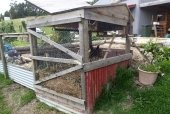Hi folks, interesting thread. Quite a few misconceptions coming up over and over again. It's worth pointing out that evolution itself is not considered a "theory" - it's an established fact; it happens and it has happened in the past, and humans and other life forms are linked. This is considered settled. The *Theory* of Evolution refers (in the same sense as the Theory of Gravity or the Theory of Relativity) to the conceptual body of knowlegdge and data that underpin our understanding of how evolution occurs now and has occurred in the past. Adaptation and evolution are the same thing - what some people call "macroevolution" is simply "microevolution" that has been going on for longer. As for epigenetics, this is of minimal importance to evolution - effectively it is another mechanism of gene regulation that in a couple of cases can be transgenerational (but not persistent enough to be that important).
As for "irreducible complexity", this is not a barrier to evolution, nor is the "information problem" - the source of information being written into genomes is the environment, and the mechanism for writing that information is natural selection (that was Darwin's key insight). There is a group in the US called the Discovery Institute who have been trying to push "Intelligent Design" as a part of a creationist agenda, but their arguments have been roundly trounced by the scientific community, including by scientists who are themselves religious. Christians such as Ken Miller and Francis Collins have been very prominent in showig that evolutionary theory is perfectly compatible with religious belief.
I guess the bottom line is that there is no reason why Christians, Jews, Muslims or others should feel they can't accept the findings of evolutionary science - I have many religious friends working in the field of genetics, and they have no problem with it; indeed, they are valued colleagues making real contributions to science. Another friend of mine who is an Anglican minister has been very vocal in his criticism of creationism and indeed wrote an article entitled "rescuing Genesis from the Creationists".
Is there a Permaculture angle to all this? Yes there is! Organisms are not static, but the genepool of a species will shift towards what "works best" within its niche (it's a bit more complex than this of course); an understanding of how evolution works can therefore be very useful to the permaculturist trying to design systems where the different elements contribute to a whole. And given that life has been trucking along abundantly on this rock for several billion years, it should be a demonstration in itself that great things can happen with a very light or indeed absent touch










 I'm trying to source a few heat resistant glass tubes to use as risers as I think they'd look great. I've also used a giant TLUD (yes, they do scale to some extent!) as a patio heater for outdoor parties in chilly NI, and with a few kilos of chipped dried willow, you get almost 90 minutes of excellent radiant heat, without burning off fossil fuels. The risers are metal, and yes, they are going to have a limited lifespan, but you can construct most out of paint tins, soup tins etc. Have fun and stay safe!
I'm trying to source a few heat resistant glass tubes to use as risers as I think they'd look great. I've also used a giant TLUD (yes, they do scale to some extent!) as a patio heater for outdoor parties in chilly NI, and with a few kilos of chipped dried willow, you get almost 90 minutes of excellent radiant heat, without burning off fossil fuels. The risers are metal, and yes, they are going to have a limited lifespan, but you can construct most out of paint tins, soup tins etc. Have fun and stay safe! 



